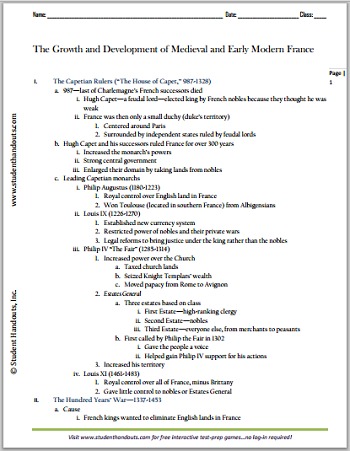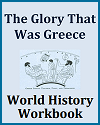| Growth and Development of Medieval and Early Modern France Outline |
|---|
| www.studenthandouts.com ↣ World History ↣ Rise of Nation-States ↣ Nation-States Outlines and PPTs |
 I. The Capetian Rulers ("The House of Capet," 987-1328)
I. The Capetian Rulers ("The House of Capet," 987-1328)a. 987—last of Charlemagne's French successors died 1. Centered around Paris 2. Surrounded by independent states ruled by feudal lords b. Hugh Capet and his successors ruled France for over 300 years i. Increased the monarch's powers ii. Strong central government iii. Enlarged their domain by taking lands from nobles c. Leading Capetian monarchs i. Philip Augustus (1180-1223) 1. Royal control over English land in France 2. Won Toulouse (located in southern France) from Albigensians ii. Louis IX (1226-1270) 1. Established new currency system 2. Restricted power of nobles and their private wars 3. Legal reforms to bring justice under the king rather than the nobles iii. Philip IV "The Fair" (1285-1314) 1. Increased power over the Church a. Taxed church lands b. Seized Knight Templars' wealth c. Moved papacy from Rome to Avignon 2. Estates General a. Three estates based on class i. First Estate—high-ranking clergy ii. Second Estate—nobles iii. Third Estate—everyone else, from merchants to peasants b. First called by Philip the Fair in 1302 i. Gave the people a voice ii. Helped gain Philip IV support for his actions 3. Increased his territory iv. Louis XI (1461-1483) 1. Royal control over all of France, minus Brittany 2. Gave little control to nobles or Estates General II. The Hundred Years' War—1337-1453 a. Cause i. French kings wanted to eliminate English lands in France b. French defeats i. Crécy, 1346 ii. Poitiers, 1356 iii. Agincourt, 1415 iv. French knights destroyed c. Joan of Arc i. Young peasant girl ii. Believed God chose her to lead French to victory iii. 1429—persuaded Charles VII to led her lead the French armies for a year iv. Had Charles VII crowned at Reims v. Ended English siege of Orléans vi. Captured by the English 1. Charged by Church with heresy and witchcraft 2. 1430—burned at the stake vii. Inspirational 1. Inspired the monarch and soldiers 2. Aroused patriotism and national pride among the people d. Results i. English gradually driven out of the country 1. 1453—only Calais still held by the English 2. End of the Hundred Years' War ii. France became a united nation iii. King's power increased because so many nobles had been killed III. Religious Wars between Protestants and Catholics a.16th century b. Wars between Huguenots (French Protestants) and Catholics c. Henry of Navarre (Henry IV)—Bourbon dynasty i. French Huguenot ii. 1589—Converted to Catholicism when he became king of France iii. Edict of Nantes (1598)—granted religious toleration to Huguenots IV. House of Bourbon—leading ministers a. Henry IV (1589-1610): Minister—Sully (1597-1610) i. Edict of Nantes (1598) ii. Reduced spending to increase revenue iii. Public works iv. Increased foreign trade and agricultural production v. France grew rich and powerful under him b. Louis XIII (1610-1643) i. Minister—Cardinal Richelieu (1624-1642) 1. Introduced absolutism to the French monarchy a. Forced Huguenots to relinquish their special political and military privileges b. Destroyed castles of the nobles c. Took over control of local government i. Local power now held by intendants, appointed by the king 2. Made France a leading European power a. Hurt the Hapsburgs (Austrians) during the Thirty Years' War (1618-1648) ii. Minister—Cardinal Mazarin (1643-1661) 1. Fronde—destroyed the nobles' power after lords tried to regain power 2. Added land 3. Increased power of France's absolute monarchy c. Louis XIV (1643-1715) i. Minister—Colbert (1665-1683) 1. Budget system 2. Encouraged industry and agriculture 3. Built up French naval forces 4. Encouraged trade by removing internal tariffs 5. Promoted colonial expansion in America and India 6. Allowed Louis to pay for costly wars V. Louis XIV—"I am the state!" a. Absolute rule i. No check on royal power ii. Ruled 72 years iii. Never called the Estates General iv. Held all power—administering justice, collecting and spending revenue (taxes), making laws, waging war, etc. b. Encouragement of culture i. Encouraged literature and the arts ii. Leading French dramatists 1. Corneille—wrote tragedies 2. Moliere—satirist 3. Racine—dramatic poet iii. Francophiles 1. Cultured Europeans adopted French manners, novels, and plays 2. Lingua franca—French language became spoken by international diplomats and high society c. The court at Versailles i. Large palace built outside of Paris ii. Nobles lived here where the king could monitor them iii. Very expensive to build and maintain d. Religious difficulties i. 1685—revoked the Edict of Nantes ii. Persecuted Huguenots 1. Many fled to England, Holland, Prussia, and to what became the United States a. Hurt French industry because many were skilled workers e. Wars i. Believed that the Rhine River was the "natural frontier" of France ii. Brought France to war with many European countries iii. Costly wars weakened France iv. Little territory gained Click here to print this outline. |
 |
 |
 |
 |
 |
| www.studenthandouts.com ↣ World History ↣ Rise of Nation-States ↣ Nation-States Outlines and PPTs |














































